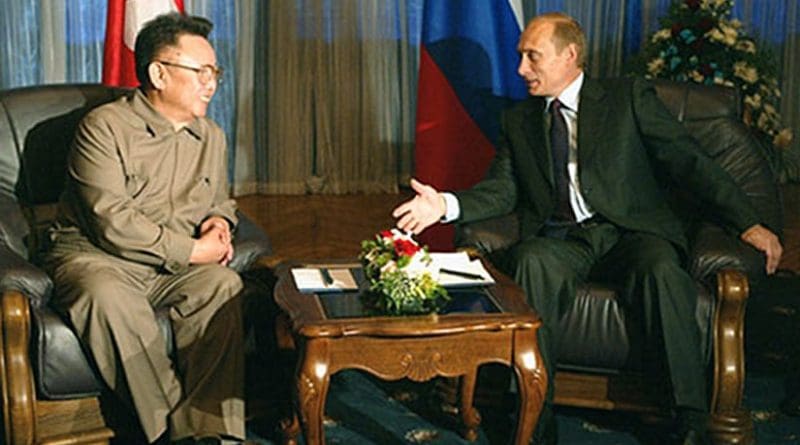Moving From Sanctions To Dialogue – OpEd
North Korea carries out a nuclear test. The international community condemns it vehemently and the UN Security Council musters up some fresh sanctions to slap on Kim Jong-un’s belligerent regime. The North Korean dictator scoffs at the sanctions and continues to pursue nuclear weapons regardless. This is the merry-go-round put into motion with each nuclear test, in 2006, 2009, 2013 and twice again this year. If the pattern sounds familiar it’s because the same futile standoff is taking place with Russia whose annexation of Crimea in 2014 has seen it subject to similar sanctions. The question is: are sanctions effective at dissuading governments from breaking international law, or do they merely embolden them?
A cursory glance at North Korea’s weapons testing schedule so far this year would strongly suggest the latter. In January, observers mocked Kim’s claim to have detonated a hydrogen bomb, pointing to seismic recordings of the test that suggested a much smaller explosion. However, in August, those same skeptics sat up and took note as the North Koreans successfully test-fired a ballistic missile from a submarine, a method of weapons delivery which is much harder to detect than an above-ground launch. And just last week, as the G20 convened in China, the North fired 3 medium-range Rodong missiles into the sea.
Evidently, sanctions against North Korea are not preventing it from pursuing its nuclear ambitions. If Kim is to be reigned in and brought around to respecting international norms – as he must – then more than likely this will come about through the restoration of multi-party talks, leaning heavily on China to restrain their cold-war ally and ensure they don’t do anything reckless.
The same scenario is playing out in Russia. The West may be appalled by Russia’s conduct, but if the long history of using sanctions to bring about change in recalcitrant regimes, including the example of North Korea, has taught us anything, it should be that they are unlikely to force the Kremlin to pull out of Ukraine or Crimea. The sanctions, which hit a range of companies in the construction, defense and extractive industries operating in Crimea, as well as individuals thought to be behind Russia’s activities in eastern Ukraine, are hardly even effective. Many of the individuals targeted simply transfer their assets to a family member. When President Putin’s top advisor, Vladislav Surkov had a travel ban imposed on him as part of the sanctions regime, he mockingly responded by saying “The only things that interest me in the US are Tupac Shakur, Allen Ginsberg, and Jackson Pollock. I don’t need a visa to access their work.”
As facile a response as this seems on the surface, there is a valid point underpinning it. In an increasingly globalized world where the Internet has broken down borders and as the idea of a new global commons is taking hold, attempts to freeze countries out of international relations look increasingly doomed to failure. More to the point, given the number of common priorities shared between Russia and the West and the many fora in which they meet to discuss them, there are ample opportunities to work on resolving their differences without recourse to such unhelpful instruments as sanctions. To be sure, there are some differences which may never be resolved: Russia’s treatment of LGBT people, Putin’s persecution of his political foes, the Kremlin’s stranglehold over the media, to name but a few. The United States had similar quarrels with the government of Fidel Castro and opted to go down the path of sanctions with them resulting in more than 60 years of recriminations and the impoverishment of the Cuban people, while failing to bring about the desired policy changes.
There is no need for Russia and the West to head down the same dead end again. Whether it be through the G20, the UNSC, or various grassroots think tanks and policy groups, stakeholders should be encouraged to take a step back from the brink, dial down on the “new cold war” rhetoric and work towards finding mutually acceptable solutions. Southern and Eastern European members looking for a more measured response should not be ostracized with such ease. When the Czech, Hungarian and Slovak leaders announced they will attend the Rhodes Forum led by the Dialogue of Civilizations Research Institute, and work towards exactly that purpose, many feared the emergence of a fifth column in Europe. But this narrative brushes aside any sort of strategic cooperation with Russia and entrenches the idea that Moscow is an irreconcilable adversary. The Rhodes forum for one, to be held between 30 September and October 1, is not even a new idea to be so casually dismissed but is born out of a UN initiative going back more than 15 years, to a time when building bridges among countries was still a laudable goal.
The alternative to more dialogue is more unnecessary suffering and entrenchment of positions, while Putin consolidates his grip on power by portraying Russia as an embattled nation, encircled by antagonists. The experience of Iraq, Cuba, Serbia and Libya among many others teaches us that sanctions are a broken tool of diplomacy more likely to lead to war than prevent it. Let’s not let that happen with Russia.
*Nicholas Kaufmann is a public affairs consultant based in Brussels.

